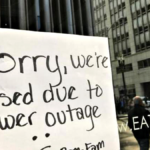Beware the dangers of ‘Zimbabwefication’!
I learnt a new word recently: Zimbabwefication and I really found it quite interesting.
The word was used in a headline in one of the South African publications for a story about the crisis currently unfolding in Mzansi. ‘SA crumbling: But don’t worry, we’re still far from Zimbabwefication’ screamed the headline.
I immediately knew what this was all about even before reading the article.
South Africa is seized with an electricity crisis, the worst the country has ever experienced and there seems to be no end in sight as the situation continues to deteriorate. Unemployment rate is currently at 27.9 percent while infrastructure is also reportedly collapsing.
These are problems that have long been associated with my home country.
Zimbabwe’s unemployment rate is pegged at 80 percent, that’s four out of every five people you meet in the street, while recently we had to endure 18-hour power cuts.
Fortunately, the situation has improved of late, with some people jokingly expressing dismay on social media if they go for three days without power cuts.
And while economists quoted in the SA publication acknowledge that their country is crumbling, they feel they are still worlds away from Zimbabwe, in their words ‘they are still far from Zimbabwefication.
I guess they have a point, as at least they still have a currency to talk about which trades with other world currencies in normal channels.
While I pray that South Africa overcomes these challenges, mainly because I have siblings, relatives and friends working and living there, there is real fear things might get worse, you just never know.
My paranoia comes from the fact that, in my youth, Zimbabwe was a country full of endless possibilities but look at where we are now.
Growing up in the 80s, we used to be gobsmacked at stories of the economic situation in Zambia. We would hear that Zambians were buying bread for a million kwacha and that they carried their money in sacks and plastic bags due to inflation which had reached alarming levels.
This sounded like fiction because by then Zimbabwe, known as the bread basket of Africa, had a very stable economy; the local dollar was almost equivalent to the British pound and all seemed on track.
But at the turn of the millennium, things took a turn for the worst. Living in Zimbabwe became a nightmare.
What had hit Zambia had now struck Zim, or maybe I should say Zimbabwe was Zambiafied. We suddenly became poor millionaires as inflation hit a global record high of 89.7 sextillion percent.
Yes, South Africa cannot be compared to us just yet but who would have thought they would experience such problems.
Fingers crossed that the situation improves because if they become Zimbabwefied, the whole region will surely feel the negative effects.





















